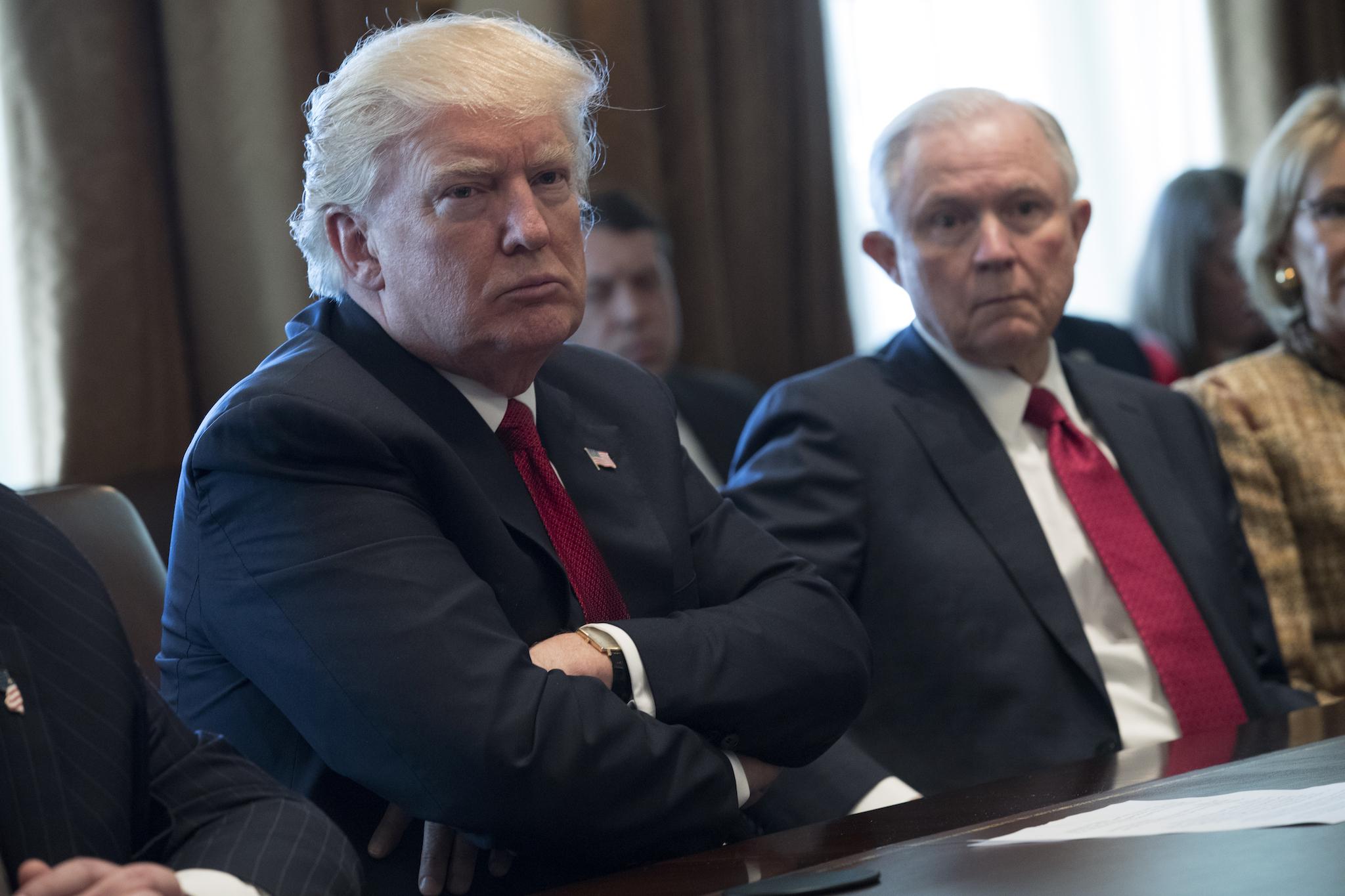A travel ban and the Russia probe
In the second instalment of our series recapping an unprecedented presidency, Joe Sommerlad looks at Trump’s early run-ins with the FBI as it examined his ties to Moscow


With his sons Don Jr and Eric left behind to run the family’s portfolio of hotels and golf courses and Melania staying in New York with their teenager Barron while he completed the school year (a separate security detail coming at no little expense to the taxpayer), Donald Trump entered the White House.
Riding roughshod over grave security concerns, the president was joined by his beloved daughter Ivanka and her husband, Jared Kushner – like himself, a Big Apple real estate scion – and immediately set about tearing up policy he took exception to like a puppy savaging a Sunday newspaper.
Trump’s first week saw him set the stage for his proposed repeal of the Affordable Care Act – bitter revenge for Barack Obama ridiculing him at the 2011 White House correspondents’ dinner over his “birther” conspiracy theory alleging the first black president was born in Kenya rather than Hawaii – and withdrawal from Trans-Pacific Partnership negotiations.
Trump said he preferred to “deal directly” with other nations, an approach that would ultimately not serve him at all well.
He also waved through the Keystone XL oil pipeline despite concerns from environmentalists and Native American rights groups and commenced preliminary planning on the “big, beautiful wall” he had promised his supporters Mexico would be paying for.
“We’ll never pay for that f***ing wall,” the country’s former president Vicente Fox told CNN that summer. “Why should Mexico pay for the wall? What’s the reason?”
But his most shocking initial foray came on 27 January when he signed an executive order freezing refugee admissions for 120 days and denying entry to citizens of seven majority-Muslim countries – Iraq, Iran, Libya, Somalia, Sudan, Syria and Yemen – for 90 days on the spurious grounds that terrorists could exploit resettlement programmes to enter the country.
Trump said he preferred to ‘deal directly’ with other nations, an approach that would ultimately not serve him at all well
The order, widely held to be discriminatory, was met with immediate outcry and inspired protests at airport terminals from NYC to Boston, Detroit, Dallas, Los Angeles, Miami, Portland and San Francisco, with at least 100 activists detained.
Just seven days into his presidency, Trump was already facing his third wave of mass demonstrations, following the ugly scenes in DC at his inauguration and the Women’s March on the nation’s capital 24 hours later, the largest single-day gathering in the US on record.
When acting attorney general Sally Yates refused to endorse his ban, suspecting it of being unlawful, the president dismissed her for “insubordination”.
A three-judge panel convened on 8 February to weigh up its validity, prompting a belligerent Trump to bemoan the interference at a sheriffs’ conference, declaring that even “a bad high school student would understand” he was within his rights.
Ironically, the president’s niece Mary Trump, a psychoanalyst by trade, would later reveal in her 2020 book Too Much and Never Enough that her uncle met that description himself during his youth in Queens, having paid a brighter pupil to take the SATs on his behalf to secure a place at Fordham University in 1964.
His restrictions nevertheless survived several legal challenges with only minor amendments: Iraq and Sudan were ultimately dropped from the blacklist and Chad, North Korea and Venezuela added.
The personnel changes that would continually rock Trump’s dysfunctional administration began when national security adviser Michael Flynn was forced to resign on 13 February, his 23-day tenure the shortest in the history of the office.
Flynn was forced to admit lying to Trump’s vice president Mike Pence and the FBI about having privately discussed US sanctions against Russia with the country’s US ambassador Sergey Kislyak after The Washington Post exposed the deception.
Relations with Moscow had been strained since at least July 2016 when evidence of Kremlin-backed efforts to interfere in the election – primarily through the spread of misinformation on social media – came to light, the Obama-era Justice Department responding by keeping tabs on Trump campaign officials over possible collusion with Russian operatives.
The name chosen for the surveillance mission – Crossfire Hurricane, taken from the opening line of the Rolling Stones’ 1968 track “Jumpin’ Jack Flash” – spoke volumes about investigators’ view of the MAGA whirlwind then bearing down on the nation and riling up votes.
Having already asked FBI director James Comey for his loyalty over a private dinner on 27 January, the president visited him on Valentine’s Day and reportedly told him: “I hope you can see your way clear to letting this go, to letting Flynn go. He’s a good guy.”
Comey refused to commit and so began Trump’s relentless Twitter griping that the ongoing investigation into whether or not his allies had cultivated foreign assistance to turn the election to his advantage was “non-sense” [sic] and “merely an attempt to cover-up the many mistakes made in Hillary Clinton’s losing campaign”.
But the story would not go away, no matter how persistently he bellowed “Hoax!”, “Witch Hunt!” or “PRESIDENTIAL HARASSMENT!” over the subsequent months and sought to rein in the media by barring CNN, the BBC, The New York Times, the Los Angeles Times, Politico and BuzzFeed from attending White House briefings.
Trump’s anger boiled over when, on 2 March, his newly minted attorney general, Alabama’s Jefferson Beauregard Sessions, replacing Yates, unexpectedly recused himself from the probe on the grounds that he too had been in contact with Russian officials but had neglected to mention it during his Senate confirmation hearings.
Trump would never forgive Sessions (memorably played as Forrest Gump by Kate McKinnon on Saturday Night Live) and instead turned to pushing wild conspiracy theories to discredit his predecessor’s motives for instigating Operation Crossfire, sensationally accusing Obama of bugging the phones at Trump Tower on 4 March, basing his allegation on little more than a Breitbart article citing speculation from, er, British former Conservative MP Louise Mensch.
“How low has President Obama gone to tapp [sic] my phones during the very sacred election process. This is Nixon/Watergate. Bad (or sick) guy!” he tweeted, presumably adjusting an elaborate tinfoil admiral’s hat with ruffled dignity as he typed.
To give an idea of his priorities here, it is worth noting that Trump also embarked on a Twitter feud with Arnold Schwarzenegger on the same day over who was responsible for the ratings decline of The Celebrity Apprentice.
The president’s frustration with Comey would only grow over the course of the spring as he implored the FBI director to help lift the “cloud” over his fledgling administration and to publicly state that he, Trump, was not personally under suspicion of being a Vladimir Putin puppet, the G-man declining and quietly taking notes on the side.
Trump finally dismissed Comey on 9 May, citing his handling of the Clinton email furore (let’s not even go there) as his nominal rationale, having plotted the axing with his West Wing inner circle for several days prior.
The decision stunned political commentators on both sides of the aisle, many of whom found themselves already fretting about the fate of the nation under a president so vengeful and indifferent to the rule of law that he would even countenance firing the head of a bureau investigating him, let alone actually go through with it.
Trump’s move left deputy attorney general Rod Rosenstein, standing in for Sessions, and acting FBI director Andrew McCabe with little choice but to appoint Comey’s predecessor Robert Mueller as FBI special counsel to clean up the whole sorry Russia mess once and for all.
Read the full The Trump Review series here
Join our commenting forum
Join thought-provoking conversations, follow other Independent readers and see their replies
Comments

Bookmark popover
Removed from bookmarks